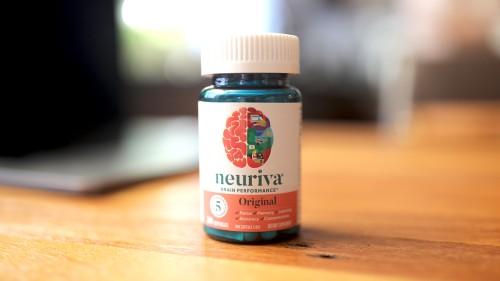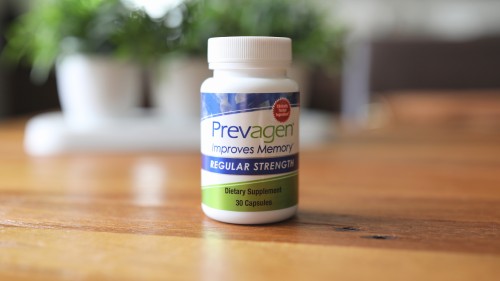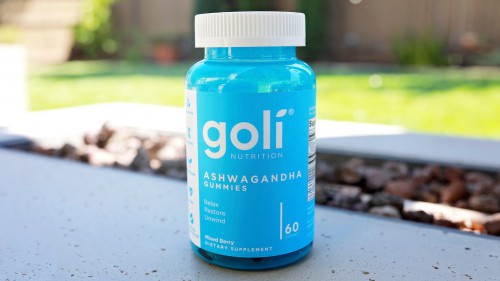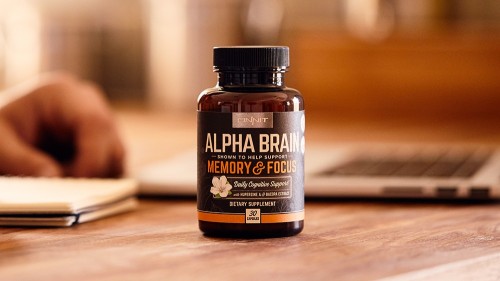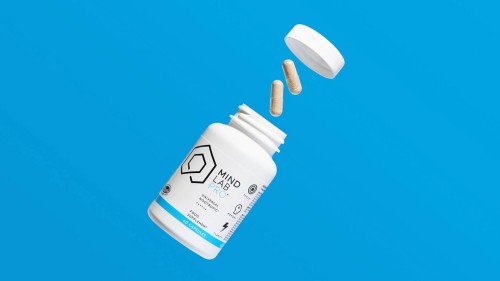The 10 Best Nootropics for Brain Health, According to a Dietitian
Published on July 5, 2021
Medically Reviewed by Anthony Dugarte, MD
Looking to enhance the power of your brain and stay focused throughout the day? Certain supplements, called nootropics, can help.


Nootropics, also known as brain enhancers, are supplements and drugs that claim to help improve cognitive function and support brain health.
There are a number of reasons why someone may want to take a nootropic to boost their mental performance.
Some may want to help keep brain fog at bay, while others want to have a competitive edge in fast-paced environments like school or work.
Certain individuals may even take nootropics to assist with healthy brain aging.
A healthy brain supports your quality of life, so here are 10 research-backed supplements that can help you stay sharp.
1. Fish Oil
Fish oil supplements contain the omega-3 fatty acids eicosapentaenoic acid (EPA) and docosahexaenoic acid (DHA). DHA has been well studied for its benefits on cognitive function.
DHA has several mechanisms of action to support brain health. It does so through anti-inflammatory activities, synthesis of other fats essential to the structure of neurons, supporting brain cell repair, and protecting against brain cell death. (1)
Fish oil supplementation is found to be effective in increasing blood flow during cognitive tasks and impacting nitric oxide production.
Clinical trials find that DHA supplementation can have a positive effect on improving memory, verbal fluency, and learning in adults, but this effect is inconsistent across studies. (2)
Low intake of dietary DHA may impact the risk of certain mood and behavior disorders.
It can also affect cognitive function. But supplementation does not have a consistent effect on improving symptoms of these conditions.
Common side effects of fish oil supplementation include skin rash, belching, nausea, heartburn, headache, and diarrhea. (3)
Excessive DHA supplementation may increase LDL cholesterol levels, and high dose fish oil supplementation may increase the risk for bleeding, especially if taking anticoagulant medications. (4)
Summary:
DHA in moderate doses may improve memory, learning, and cognition in adults, but studies do not show consistent results from DHA supplementation.
Related: Best Fish Oil Supplements of 2022, According to Dietitians
2. Ginkgo Biloba
Ginkgo biloba extracts come from the leaves of the ginkgo tree, which originates from Asia and has been used in traditional Chinese medicine for a number of conditions.
The active components of ginkgo biloba extract include terpenoids and flavonoids, two groups of antioxidants. (5)
These antioxidants improve blood circulation, enhance neuron plasticity, strengthen capillary walls, and improve oxygen supply in the brain.
A 2016 systematic review found that supplementation with ginkgo biloba in combination with conventional medicine improved Mini-Mental State Examination scores for patients with Alzheimer’s disease and mild cognitive impairment. (6)
It also helped improved activities of daily living scores for individuals with Alzheimer’s.
Other studies find that ginkgo biloba may be effective in improving attention, reducing fatigue, alleviating symptoms of anxiety, reducing stress, improving memory, along with other neuroprotective effects. (5)
Side effects of ginkgo biloba may include dizziness, headache, tinnitus, and chest pain. (7)
Ginkgo biloba can potentially interact with a variety of medicines, including anticoagulants, antihypertensives, anti-hyperglycemic medications, omeprazole, and trazodone. (8)
It may also increase the risk of certain types of cancers.
Summary:
Ginkgo biloba is a supplement that may improve Alzheimer’s symptoms and improve cognitive function through improved blood flow and antioxidant activity. Still, it poses a risk due to multiple medication interactions and increasing cancer risk.
3. Acetyl-L-Carnitine
Acetyl-l-carnitine is a derivative of the amino acid lysine. It is responsible for the transport of fats into the mitochondria to be metabolized.
The exact mechanism of action of acetyl-l-carnitine on brain health is still unknown.
Studies suggest that it may stabilize the fluidity of cell membranes, reduce oxidative stress, and help prevent excessive damage and degeneration.
Acetyl-l-carnitine has been studied for use in several cognitive disorders. A recent 2020 review found that acetyl-l-carnitine supplementation improved cognition in people with mild cognitive impairment. (9)
It may also have a positive impact on symptoms of Alzheimer’s and other types of dementia.
The benefits of acetyl-l-carnitine do not appear to translate to a healthy population, though more research needs to be done.
A 2017 review was only able to find two randomized trials on the effects of L-carnitine on cognitively healthy individuals. (10)
There was no evidence that supplementation had an effect on concentration, immediate or delayed memory recall, or reaction time.
Side effects of acetyl-l-carnitine are mild and include nausea, insomnia, agitation, and increased appetite. (10)
Summary:
Acetyl-L-Carnitine may be beneficial for individuals with mild cognitive impairment and neurodegenerative conditions. But it does not currently show any benefit on cognitive performance in healthy adults.
4. L-Theanine
L-theanine is an amino acid found in tea and mushrooms.
Research shows that L-theanine increases alpha-wave activity in the brain, which is seen in healthy adults when resting with closed eyes. (11)
L-theanine supplementation helped decrease subjective stress response and cortisol response to a multitasking activity in a study with healthy adults aged 18–40 years. (12)
Anxiety-prone individuals in the study also experienced an increase in resting-state alpha waves after the trial compared to a placebo. This indicates less anxiety when taking L-theanine.
A small study published in 2018 found that healthy men who either had a drink of L-theanine or a combination of L-theanine and caffeine before a specific task had improved attention to visual targets compared to a placebo. (13)
Overall, L-theanine may be effective in helping with acute stress, but there is little evidence about whether it is effective for chronic conditions. (14)
In the studies reviewed, no adverse effects were found when taking L-theanine supplements when compared to a placebo.
If choosing to get L-theanine from tea, there is the potential of liver toxicity and gastrointestinal symptoms, especially if consumed on an empty stomach. (15)
Summary:
L-theanine has the potential to decrease stress, improve task-related attention, and increase alpha waves during rest, but long-term studies with larger groups need to be done to confirm its efficacy.
5. Bacopa monnieri
Bacopa monnieri is an herb used in Ayurvedic and Traditional Chinese Medicine to enhance cognitive function.
Bacopa monnieri contains antioxidants that have anti-inflammatory properties that reduce neuroinflammation in the central nervous system and support brain health. (16)
Supplementation with Bacopa monnieri can reduce the release of the inflammatory markers related to cognitive decline.
A 2016 randomized trial involving a group of medical students taking 150 mg of a Bacopa monnieri extract twice daily for six weeks found that the students had improvements in attention, working memory, immediate recall, and improved focus compared to a placebo. (17)
Other clinical trials found that Bacopa monnieri, either alone or with other nootropic ingredients, can improve cognition, decrease stress, improve memory and performance on other neuropsychological tests. (18)
Bacopa monnieri may cause gastrointestinal effects, including increased bowel movements, abdominal cramps, and nausea. (19)
Summary:
Bacopa monnieri is an Ayurvedic herb that has the potential to improve attention, memory, stress, and other measures of cognitive function, with some noted gastrointestinal effects.
6. Ashwagandha
Ashwagandha root extract comes from a small evergreen shrub grown in India, the Middle East, and Africa.
It is commonly used in Ayurveda for several conditions, including memory and cognition.
Ashwagandha contains alkaloids and withanolides, which is a group of naturally occurring steroids.
These compounds have many functions. They can modulate the immune system and act as antioxidants and anti-inflammatories. (20)
Ashwagandha may be effective in improving memory and cognition in individuals with mild cognitive impairment.
In a study published in 2017, 50 individuals with mild cognitive impairment had improvements in executive function, sustained attention, and information processing speed after taking 300 mg of ashwagandha root twice daily for eight weeks compared to a placebo. (21)
Much research on the benefits of ashwagandha on cognition is largely made up of animal (pre-clinical) studies. (22)
However, in the clinical studies that do exist, ashwagandha extract appears to improve executive function, attention, reaction time, and performance on cognitive tasks in people with cognitive dysfunction. (23)
In the studies reviewed, ashwagandha did not have any noted adverse effects.
Summary:
Ashwagandha appears to improve executive function, attention, information processing, reacting time, and general cognitive performance in individuals with cognitive dysfunction or impairment and is well tolerated.
7. Phosphatidylserine
Phosphatidylserine is a phospholipid that is abundant in the brain that is important for the integrity of the nerve cell membrane and makes up myelin sheath which helps protect neurons.
Phosphatidylserine is necessary for the activation of several signaling pathways within the neuron for growth, survival, and communication. (24)
Supplementation with 200 mg of phosphatidylserine for two months was found to be effective in improving symptoms of ADHD and short-term memory in children ages 4–14 years when compared to a placebo. (25)
Chronic supplementation with phosphatidylserine may decrease brain stress response and improve relaxation before and after exposure to stress. (26)
Phosphatidylserine with DHA was found to improve sustained attention and memory recognition in non-demented elderly individuals with memory complaints. (27)
A similar effect on memory was found in older adults taking a soybean-derived form of phosphatidylserine. (28)
Potential side effects from taking phosphatidylserine include belching, acid reflux, high blood pressure, and uneasiness. (29)
Summary:
Phosphatidylserine is a phospholipid necessary for brain health and may help with ADHD symptoms, decreasing stress, improving attention, and improving memory.
8. Huperzine A
Huperzine A is an extract of the Chinese herb Huperzia serrata used in traditional Chinese medicine for fever and inflammation.
Huperzine A is an acetylcholinesterase inhibitor and prevents the breakdown of the neurotransmitter acetylcholine.
Acetylcholine is important in several functions, including learning, memory, attention, REM sleep, and motivation.
Much of the research on this extract is on its potential effects on Alzheimer’s disease.
Studies suggest that huperzine A may slow down neuronal death in Alzheimer’s disease and other neurodegenerative conditions. (30)
A 2013 review found that huperzine A supplementation may improve cognitive function, activities of daily living.
However, much of the available research has high bias and is not of great quality.
Huperzine A may also be effective in helping cognitive function in individuals with schizophrenic spectrum disorders. (31)
Side effects from taking huperzine A include mild nausea and dizziness.
Summary:
Huperzine A may be helpful in improving cognitive function, but poor quality studies limit the current research to support its claims for brain health.
9. L-Tyrosine
L-tyrosine is an amino acid that serves as a precursor to the neurotransmitters dopamine and norepinephrine.
This amino acid is thought to be effective as a supplement for cognition by reducing neurotransmitter depletion, a process in which increased brain activity will decrease concentrations of dopamine and norepinephrine. (32)
If these neurotransmitters are depleted, then cognitive and behavioral performance decline.
Research supports tyrosine for improving cognitive performance in situations that are cognitively demanding or include short-term stress, but only during neurotransmitter depletion. (33)
Inadequate tyrosine intake has been associated with the decreased synthesis of dopamine within the brain and lower working memory performance in elderly adults. (34)
No side effects for tyrosine were noted in the studies included in this review.
Summary:
L-tyrosine may help cognitive performance by reducing neurotransmitter depletion, but there is very limited research on its effectiveness.
10. Oat Straw Extract (Avena sativa)
Avena sativa is an extract from immature or “green” oats.
Avena sativa extracts contain several antioxidants and phytochemicals, including terpenes, phenolic acids, and polyphenols.
Two specific antioxidants are avenacins and avenanthramides, which are specific to oats.
The phytochemicals in Avena sativa work by interacting with neurotransmitter function, modulating hormone function, and cell signaling in the brain.
A 2020 randomized trial had adults between 35 to 65 years receive either 430 mg, 860 mg, 1290 mg of a green oat extract or placebo for 29 days. (35)
By the end of the trial, participants had improvements in working memory and multitasking compared to a placebo. It also reduced physiological responses to stress.
In a 2017 study with adults with self-reported memory declines, single-dose supplementation with a wild green-oats extract (at either 800 mg or 1600 mg) improved working memory, speed of cognitive performance, executive function, and performance of delayed word recall compared to a placebo. (36)
Side effects from Avena sativa may include headache and tiredness, but these effects were not seen to be different from the placebo in the studies.
Summary:
Avena sativa supplementation appears to be effective in improving memory and cognitive performance, though more research on the dosage and optimal length of supplementation should be done.
The Bottom Line
The brain is a complex organ, and it is difficult to point to one supplement or behavior that will help you stay focused and perform at your cognitive best.
Many of the most popular nootropic supplements include amino acids or fats that are present within the brain or have antioxidant activity.
With this in mind, your diet can have a huge impact on providing the nutrients you need to support your brain.
Foods like fruits and vegetables provide antioxidants that can assist in reducing the inflammation in your body. In addition, fatty fish, other types of seafood, and algae are great sources of DHA.
You can also get the various amino acids your body needs for neurotransmitter production from many sources, including nuts and seeds, meat and seafood, grains, eggs, and dairy.
Exercise maintains good blood flow throughout the brain and helps strengthen neural activity to improve learning, memory, and regeneration of nerve cells. (37)
Sometimes brain fog could be related to not getting enough sleep at night.
The National Sleep Foundation recommends that adults get between 7 to 9 hours of sleep per night to maintain cognitive function and brain repair.
Managing your stress levels through enjoyable activities or meditative practices can potentially help you have the mental energy to take on the tasks that you encounter throughout the day.
If you have concerns about your mental function or notice any changes in your cognition, I recommend speaking with your doctor to get a complete assessment.
From there, you can get further insight into how your body is functioning and get the plan of care that’s right for you.
At WellnessVerge, we only use reputable sources, including peer-reviewed medical journals and well-respected academic institutions.
- Dietary DHA and health: cognitive function ageing:
https://pubmed.ncbi.nlm.nih.gov/27866493/ - How does high DHA fish oil affect health? A systematic review of evidence:
https://pubmed.ncbi.nlm.nih.gov/29494205/ - Safety and tolerability of prescription omega-3 fatty acids: A systematic review and meta-analysis of randomized controlled trials:
https://pubmed.ncbi.nlm.nih.gov/29482765/ - Omega-3 Polyunsaturated Fatty Acids: Benefits and Endpoints in Sport:
https://www.ncbi.nlm.nih.gov/pmc/articles/PMC6357022/ - Neuroprotective and Antioxidant Effect of Ginkgo biloba Extract Against AD and Other Neurological Disorders:
https://pubmed.ncbi.nlm.nih.gov/31376068/ - Ginkgo Biloba for Mild Cognitive Impairment and Alzheimer's Disease: A Systematic Review and Meta-Analysis of Randomized Controlled Trials:
https://pubmed.ncbi.nlm.nih.gov/26268332/ - Efficacy and adverse effects of ginkgo biloba for cognitive impairment and dementia: a systematic review and meta-analysis:
https://pubmed.ncbi.nlm.nih.gov/25114079/ - Review of Ginkgo biloba-induced toxicity, from experimental studies to human case reports:
https://pubmed.ncbi.nlm.nih.gov/28055331/ - Acetyl-L-Carnitine in Dementia and Other Cognitive Disorders: A Critical Update:
https://pubmed.ncbi.nlm.nih.gov/32408706/ - L-carnitine for cognitive enhancement in people without cognitive impairment:
https://pubmed.ncbi.nlm.nih.gov/28349514/ - L-theanine, a natural constituent in tea, and its effect on mental state:
https://pubmed.ncbi.nlm.nih.gov/18296328/ - Anti-Stress, Behavioural and Magnetoencephalography Effects of an L-Theanine-Based Nutrient Drink: A Randomised, Double-Blind, Placebo-Controlled, Crossover Trial:
https://pubmed.ncbi.nlm.nih.gov/26797633/ - l-Theanine and caffeine improve target-specific attention to visual stimuli by decreasing mind wandering: a human functional magnetic resonance imaging study:
https://pubmed.ncbi.nlm.nih.gov/29420994/ - The Effects of Green Tea Amino Acid L-Theanine Consumption on the Ability to Manage Stress and Anxiety Levels: a Systematic Review:
https://pubmed.ncbi.nlm.nih.gov/31758301/ - Toxicological effects of Camellia sinensis (green tea): A review:
https://onlinelibrary.wiley.com/doi/abs/10.1002/ptr.6063 - The Ayurvedic plant Bacopa monnieri inhibits inflammatory pathways in the brain:
https://pubmed.ncbi.nlm.nih.gov/27473605/ - Efficacy of Standardized Extract of Bacopa monnieri (Bacognize®) on Cognitive Functions of Medical Students: A Six-Week, Randomized Placebo-Controlled Trial:
https://pubmed.ncbi.nlm.nih.gov/27803728/ - Bacopa monnieri, a Neuroprotective Lead in Alzheimer Disease: A Review on Its Properties, Mechanisms of Action, and Preclinical and Clinical Studies:
https://pubmed.ncbi.nlm.nih.gov/31391778/ - Does Bacopa monnieri improve memory performance in older persons? Results of a randomized, placebo-controlled, double-blind trial:
https://pubmed.ncbi.nlm.nih.gov/20590480/ - Nootropic potential of Ashwagandha leaves: Beyond traditional root extracts:
https://pubmed.ncbi.nlm.nih.gov/26361721/ - Efficacy and Safety of Ashwagandha (Withania somnifera (L.) Dunal) Root Extract in Improving Memory and Cognitive Functions:
https://pubmed.ncbi.nlm.nih.gov/28471731/ - Neurodegenerative diseases and Withania somnifera (L.): An update:
https://pubmed.ncbi.nlm.nih.gov/32240781/ - A systematic review of the clinical use of Withania somnifera (Ashwagandha) to ameliorate cognitive dysfunction:
https://pubmed.ncbi.nlm.nih.gov/31742775/ - Phosphatidylserine in the brain: metabolism and function:
https://pubmed.ncbi.nlm.nih.gov/24992464/ - The effect of phosphatidylserine administration on memory and symptoms of attention-deficit hyperactivity disorder: a randomised, double-blind, placebo-controlled clinical trial:
https://pubmed.ncbi.nlm.nih.gov/23495677/ - Influence of phosphatidylserine on cognitive performance and cortical activity after induced stress:
https://pubmed.ncbi.nlm.nih.gov/18616866/ - The effect of phosphatidylserine-containing omega-3 fatty acids on memory abilities in subjects with subjective memory complaints: a pilot study:
https://pubmed.ncbi.nlm.nih.gov/21103402/ - Soybean-derived phosphatidylserine improves memory function of the elderly Japanese subjects with memory complaints:
https://pubmed.ncbi.nlm.nih.gov/21103034/ - Omega-3 fatty acids administered in phosphatidylserine improved certain aspects of high chronic stress in men:
https://pubmed.ncbi.nlm.nih.gov/22575036/ - Huperzine A: Is it an Effective Disease-Modifying Drug for Alzheimer's Disease?:
https://pubmed.ncbi.nlm.nih.gov/25191267/ - Adjunctive huperzine A for cognitive deficits in schizophrenia: a systematic review and meta-analysis:
https://pubmed.ncbi.nlm.nih.gov/27302211/ - Behavioral and cognitive effects of tyrosine intake in healthy human adults:
https://pubmed.ncbi.nlm.nih.gov/25797188/ - Effect of tyrosine supplementation on clinical and healthy populations under stress or cognitive demands--A review:
https://pubmed.ncbi.nlm.nih.gov/26424423/ - Influence of nutritional tyrosine on cognition and functional connectivity in healthy old humans:
https://pubmed.ncbi.nlm.nih.gov/30853567/ - Acute and Chronic Effects of Green Oat ( Avena sativa) Extract on Cognitive Function and Mood during a Laboratory Stressor in Healthy Adults: A Randomised, Double-Blind, Placebo-Controlled Study in Healthy Humans:
https://pubmed.ncbi.nlm.nih.gov/32485993/ - Acute effects of a wild green-oat (Avena sativa) extract on cognitive function in middle-aged adults: A double-blind, placebo-controlled, within-subjects trial:
https://pubmed.ncbi.nlm.nih.gov/26618715/ - Exercise builds brain health: key roles of growth factor cascades and inflammation:
https://pubmed.ncbi.nlm.nih.gov/17765329/

